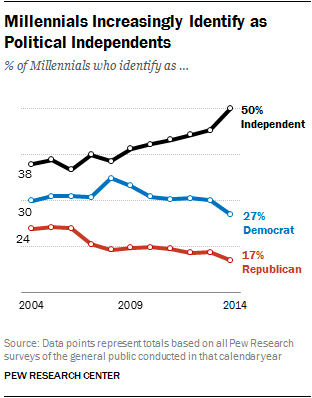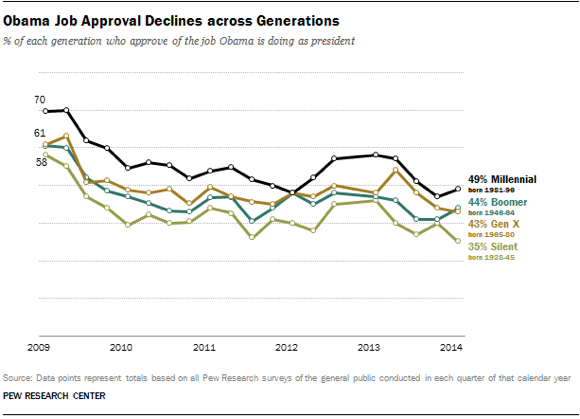
The Pew Research Center offers a trove of data on Millennial Americans. Conservatives rank repealing Obamacare as high as improving the economy. And yes, it's true. We can't stop obsessing about job rating answer scales. This is HuffPollster for Friday, March 7, 2014.
MILLENNIALS IN ADULTHOOD - A massive new report from the Pew Research Center traces the "distinctive path" being followed by the Millennial generation: "Now ranging in age from 18 to 33, they are relatively unattached to organized politics and religion, linked by social media, burdened by debt, distrustful of people, in no rush to marry— and optimistic about the future. They are also America’s most racially diverse generation. In all of these dimensions, they are different from today’s older generations. And in many, they are also different from older adults back when they were the age Millennials are now. Pew Research Center surveys show that half of Millennials (50%) now describe themselves as political independents and about three-in-ten (29%) say they are not affiliated with any religion. These are at or near the highest levels of political and religious disaffiliation recorded for any generation in the quarter-century that the Pew Research Center has been polling on these topics. At the same time, however, Millennials stand out for voting heavily Democratic and for liberal views on many political and social issues, ranging from a belief in an activist government to support for same-sex marriage and marijuana legalization." [Pew Research]
Racial diversity - Pew Research: "Millennials are the most racially diverse generation in American history, a trend driven by the large wave of Hispanic and Asian immigrants who have been coming to the U.S. for the past half century, and whose U.S.-born children are now aging into adulthood. In this realm, Millennials are a transitional generation. Some 43% of Millennial adults are non-white, the highest share of any generation. About half of newborns in America today are non-white, and the Census Bureau projects that the full U.S. population will be majority non-white sometime around 2043. The racial makeup of today’s young adults is one of the key factors in explaining their political liberalism. But it is not the only factor."
Liberalism - Pew Research: "Millennials continue to view the Democratic Party more favorably than the Republican Party. And Millennials today are still the only generation in which liberals are not significantly outnumbered by conservatives...Millennials’ liberalism is apparent in their views on a range of social issues such as same-sex marriage, interracial marriage and marijuana legalization. In all of these realms, they are more liberal than their elders. However, on some other social issues—including abortion and gun control—the views of Millennials are not much different from those of older adults.
Obama approval slides among all generations - "President Obama was swept into the White House in 2008 on a wave of support from young voters. Yet within six months of taking office, his job approval rating began to slide among all generations. Among Millennials, Obama’s job approval has fallen from 70% in those first honeymoon months of 2009, his highest rating among any generation, to 49% in combined surveys from January and February 2014. The falloff has been about as steep among Silents (23 points), Gen Xers (18 points) and Boomers (17 points). [Pew Research]
REPEALING OBAMACARE A TOP CONSERVATIVE PRIORITY - Emily Swanson: "Conservatives are just as likely to say the government's top priority this year should be repealing President Obama's health care law as to say improving the economy should take the top spot, according to a HuffPost/YouGov poll conducted ahead of the Conservative Political Action Committee's annual conference, which started Thursday. Among all Americans, improving the economy was the clear-cut winner. Asked to choose from a list, 51 percent ranked that as the No. 1 issue the government faces, while 21 percent ranked repealing the health care law at the top...People who identify as liberal or moderate were equally likely to place improving the economy at the top among those priorities, at 56 percent each. But only 40 percent of conservatives said the same. About as many -- 39 percent -- said that repealing the health care law should be at the top of the list." [HuffPost]
DE BLASIO EXCELLENT/GOOD RATING AT 39 PERCENT - Michael Howard Saul: "Thirty-nine percent of registered voters in New York City approve of Mayor Bill de Blasio's job performance two months after he took the reins of the nation's largest city, a poll from The Wall Street Journal-NBC 4 New York-Marist showed Thursday. While many New Yorkers have a favorable view of the city's new mayor, saying Mr. de Blasio cares about the average person and is fulfilling his campaign promises, they don't give him high marks as a chief executive. According to the poll, the first WSJ-NBC-Marist survey of his tenure, 10% of voters described Mr. de Blasio's job performance as excellent and 29% characterized it as good, while 37% rated it as fair and 20% said he is doing poorly. The poll showed 5% either never heard of the mayor or were unsure how to rate him. Mr. de Blasio's job-performance rating is markedly lower than Mr. Bloomberg's at the same point after he took office in 2002. At that time, 50% approved of Mr. Bloomberg's job performance, and only 6% said Mr. Bloomberg was doing poorly in his new job." [Wall Street Journal]
More commentary on the 'excellent-good-fair-poor' scale -Thursday's HuffPollster, which noted polls using a scale of "excellent, good, fair or poor" typically find smaller positive job ratings than polls that use an "approve or disapprove" scale. The reason appears to be that some respondents hear "fair" as more neutral than negative. Spurred in part by that report, some poll watchers took to Twitter to complain using an "excellent" or "good' rating to equate with "approval:"
-DailyKos Political Director David Nir: "Another entry for the "why 'fair' sucks" file [link to WSJ story] Seriously, @MaristPoll...[Earlier:] The problem isn't the scale, it's the ambiguity of the word 'fair,' which means too many things in English." [@DKElections here and here]
-Democratic pollster Nick Gourevitch: "Common terminology mistake in this article on Mayoral job ratings. Excellent/good ≠ approve. Fair/poor ≠ disapprove. http://t.co/7yLaBUnuMc" [@nickgourevitch]
-FiveThirtyEight's Harry Enten: "My general rule on fair is that about 2/3's of people who give it would disapprove, while 1/3 would approve. Just a general rule tho." [@ForecasterEnten]
-Via email, the Mellman Group's Skip Perry (D) offers a qualified defense of Marist's scale: "Excellent/good/only fair/poor is a different, tougher standard than approve/disapprove that 1) provides useful information about what voters think about the job an officeholder is doing and 2) is distinct from overall favorability. We can all think of incumbents who might be well-liked but are nonetheless endangered because voters don't think they are doing at least a 'good' job. Reporters need to be careful about how they write about EGFP data but that's the case with all poll reporting, where favorability and job approval ratings, RV and LV surveys, etc. are routinely conflated."
False equivalence - The comments by Gourevitch and Perry get to the heart of the issue: Whatever their merits, the "excellent-good-fair-poor" and "approve-disapprove" scales produce different measurements, even if both ask explicitly about an officeholder's job performance. Yet journalists and other poll watchers often treat the two types of ratings as equivalent -- something made implicit by the use of term "approval" to describe both -- putting those officeholders with the misfortune of having their performance measured by the more demanding "excellent-good" scale at a disadvantage.
HUFFPOLLSTER VIA EMAIL! - You can receive this daily update every weekday via email! Just enter your email address in the box on the upper right corner of this page, and click "sign up." That's all there is to it (and you can unsubscribe anytime).
FRIDAY'S 'OUTLIERS' - Links to the best of news at the intersection of polling, politics and political data:
-The Keystone XL pipeline has wide support among Americans. [WashPost]
--67 percent of Americans say they would vote out all current members of Congress, including their own senators and representative. [Fox]
-Another Pennsylvania poll shows Gov. Tom Corbett (R) with a low (33 percent) job rating and Thomas Wolf far ahead among those vying for the Democratic nomination. [RMU]
-The Bloomberg Consumer Comfort index has improved for four straight weeks. [Bloomberg]
-A Hart(D)/McIntuff(R) poll finds most Americans want to repair Obamacare rather than repeal it. [Fiscal Times]
-A majority of the uninsured (55 percent) say they will get health insurance. [Gallup]
-Two surveys find few uninsured Americans signing up via the new health insurance marketplac. [WaPost]
-Democrats Stan Greenberg and James Carville explain why they see hope for Democrats in 2014 from the new Post/ABC poll. [National Memo]
-Ron Brownstein says the concentration of the Democrats' demographic coalition in urban areas leaves them vulnerable to losing the Senate in 2014. [National Journal]
-Dancing Statistics demonstrates statistical concepts through dance videos. [Flowing Data]

